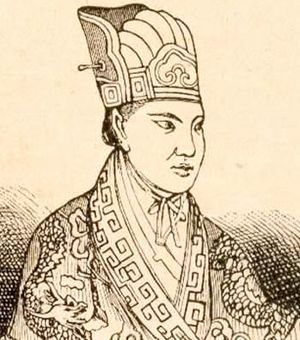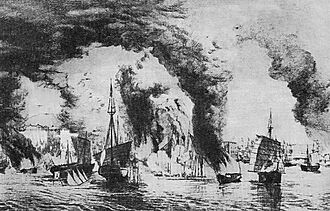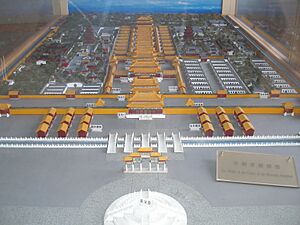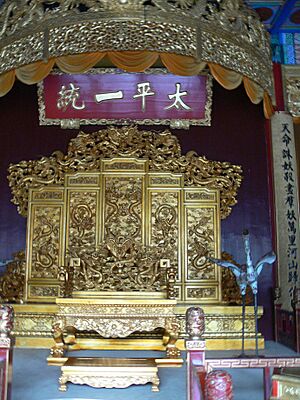Taiping Heavenly Kingdom facts for kids
Quick facts for kids
Heavenly Kingdom of Great Peace
|
|||||||||
|---|---|---|---|---|---|---|---|---|---|
| 1851–1864 | |||||||||
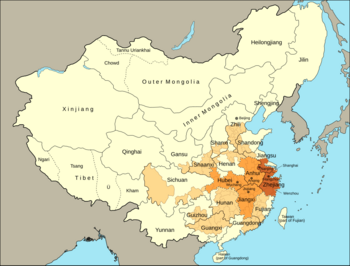
Outline of the Taiping Heavenly Kingdom
Held at various time during the Taiping Rebellion Early period Late period |
|||||||||
| Capital | Tianjing (now Nanjing) | ||||||||
| Religion | |||||||||
| Government | Theocratic monarchy | ||||||||
| Taiping Heavenly King | |||||||||
|
• 1851–1864
|
Hong Xiuquan | ||||||||
|
• 1864
|
Hong Tianguifu | ||||||||
| Kings/Prince | |||||||||
|
• 1851–1852
|
Feng Yunshan | ||||||||
|
• 1851–1856
|
Yang Xiuqing | ||||||||
|
• 1851–1852
|
Xiao Chaogui | ||||||||
|
• 1851–1856
|
Wei Changhui | ||||||||
|
• 1851–1863
|
Shi Dakai | ||||||||
| Historical era | Late modern period | ||||||||
|
• Jintian Uprising
|
11 January 1851 | ||||||||
|
• Capture of Nanjing
|
19 March 1853 | ||||||||
|
• Tianjing Incident
|
1856 | ||||||||
|
• Fall of Nanjing
|
19 July 1864 | ||||||||
|
• Capture of Hong Tianguifu
|
25 October 1864 | ||||||||
| Currency | Shengbao (cash) | ||||||||
|
|||||||||
| Taiping Heavenly Kingdom | |||||||||||||||||||||||||
|---|---|---|---|---|---|---|---|---|---|---|---|---|---|---|---|---|---|---|---|---|---|---|---|---|---|
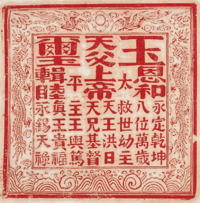
Royal seal of the Taiping Heavenly Kingdom
|
|||||||||||||||||||||||||
| Traditional Chinese | 太平天囯 | ||||||||||||||||||||||||
| Simplified Chinese | 太平天国 | ||||||||||||||||||||||||
| Literal meaning |
|
||||||||||||||||||||||||
|
|||||||||||||||||||||||||
The Taiping Heavenly Kingdom was a powerful state in China from 1851 to 1864. Its official name was the Heavenly Kingdom of Great Peace. It was a theocratic monarchy, meaning it was ruled by religious leaders. The main goal of this kingdom was to overthrow the Qing dynasty, which was the ruling family of China at the time.
The leader of the Heavenly Kingdom was Hong Xiuquan. He believed he was the younger brother of Jesus Christ. His capital city was Tianjing, which is now known as Nanjing. The long and bloody war between the Taiping Heavenly Kingdom and the Qing dynasty is called the Taiping Rebellion.
Hong Xiuquan led a huge army that took control of a large part of southern China. At its peak, nearly 30 million people lived in the areas controlled by the Taiping. The kingdom introduced many new rules and tried to replace old Chinese religions like Buddhism and Confucianism with its own form of Christianity. The Qing government, with help from British and French forces, eventually defeated the Taiping Rebellion.
Contents
Why the Taiping Rebellion Started
In the 1800s, China faced many problems. There were famines, natural disasters, and economic troubles. The Qing dynasty also lost battles to foreign powers, which was a big blow to their pride. Farmers were struggling with high taxes and rising rents, forcing many to leave their homes.
The Chinese economy was also hurt by unfair trade with other countries. Because of all these issues, banditry became common. Many secret groups and self-defense units formed, leading to small fights everywhere.
Hong Xiuquan's Vision
Around this time, Christian missionaries came to China. One of their books, called Good Words to Admonish the Age, was read by a young scholar named Hong Xiuquan. At first, he didn't pay much attention to it.
However, after failing important government exams several times, Hong had a nervous breakdown. He later told his family about a dream. In this dream, he met a golden-haired, bearded man and a younger man he called "Elder Brother." He also saw Confucius being punished for leading people astray.
Years later, Hong reread the book and understood his dream in a new way. He believed the bearded man was God the Father, and the younger man was Jesus. He thought he was Jesus's younger brother. Hong felt it was his duty to bring back a pure faith and overthrow the Qing dynasty. He was joined by Yang Xiuqing, who claimed to speak for God.
The God Worshipping Society
In 1844, Feng Yunshan started the God Worshipping Society to spread Hong's ideas. Hong became the leader of this group in 1847. Their faith was inspired by Christianity but developed into a unique Chinese religion. Hong said it was a return to an ancient Chinese belief in Shangdi (the Supreme Emperor).
The group grew stronger by fighting bandits. But when the Qing government started to persecute them, the movement turned into a civil war.
Key Events of the Taiping Rebellion
Starting the Kingdom
The Jintian Uprising began in 1850 in Guangxi. On January 11, 1851, which was Hong Xiuquan's birthday, he declared himself the "Heavenly King" of a new dynasty. He called it the "Heavenly Kingdom of Great Peace."
After some small fights, the rebellion grew in February 1851. A rebel army of 10,000 soldiers defeated a smaller Qing force. Feng Yunshan was a key strategist and administrator for the kingdom until he died in 1852.
In 1853, the Taiping forces captured Nanjing. They made it their capital and renamed it Tianjing, meaning 'heavenly capital'. When Nanjing was taken, there was intense fighting, and many people, especially the Manchu population, lost their lives.
At its strongest, the Heavenly Kingdom controlled much of southern China, especially the fertile Yangtze River Valley. Controlling the river made it easy for them to supply their capital. From there, the Taiping rebels sent armies west and north. They tried to capture Beijing, the Qing capital, but they failed.
Problems Within the Kingdom
After 1853, Hong Xiuquan started to step back from daily rule. He mostly communicated through religious messages. He began to distrust Yang Xiuqing, who claimed to speak as God and had many spies. In 1856, Yang and his family were killed by Hong's followers. This event, known as the Tianjing incident, greatly weakened the Taiping forces.
With their leader less involved, Taiping representatives tried to get more support from Chinese middle classes and make friends with European countries. But they failed. Europeans decided to stay neutral.
Inside China, the rebellion faced resistance because they were against traditional Chinese customs and Confucian values. Landowners, who didn't like the Taiping rebels' peasant ways or their strict rules (like separating married couples), sided with the Qing forces.
In 1859, Hong Rengan, Hong Xiuquan's cousin, joined the rebellion in Nanjing. He was given a lot of power and planned to expand the kingdom. In 1860, the Taiping rebels captured Hangzhou and Suzhou to the east. However, they failed to take Shanghai, which marked the beginning of their decline.
The Fall of the Kingdom
In August 1860, the Taiping tried to take Shanghai. They had some early success but were eventually pushed back by Chinese troops and European officers. This force later became known as the "Ever Victorious Army," led by Charles "Chinese" Gordon. This army was very important in defeating the Taiping rebels.
The Qing forces were reorganized under new commanders, Zeng Guofan and Li Hongzhang. They began to take back control of areas held by the Taiping. By early 1864, the Qing dynasty had regained most of the territory.
As Qing forces attacked Nanjing, Hong Xiuquan said God would protect the city. But in June 1864, with food running out, he died from food poisoning after eating wild vegetables. He was sick for twenty days before the Qing forces took the city. Just days after his death, Nanjing fell. His body was later dug up and burned to make sure his remains had no resting place, as a punishment for the rebellion.
Four months before Nanjing fell, Hong Xiuquan had given up his leadership to his 14-year-old son, Hong Tianguifu. But Hong Tianguifu could not save the kingdom. It was quickly destroyed when Nanjing fell in July 1864 after fierce street fighting. Most of the Taiping leaders were executed by Qing officials.
Even after Nanjing fell, thousands of Taiping rebels continued to fight. It took seven more years to completely end the rebellion. In August 1871, the last Taiping rebel army was finally defeated by Qing forces.
Leaders of the Heavenly Kingdom
Heavenly Kings
The "Heavenly King" was the highest position in the Taiping Heavenly Kingdom. Only two people held this title:
| Personal name | Period of reign |
|---|---|
|
|
|
|
|
|
Other Important Leaders
Below the Heavenly King, the kingdom was divided among rulers called kings or princes. At first, there were five main kings: the Kings of the Four Cardinal Directions and the Flank King.
- South King (南王), Feng Yunshan (died 1852)
- East King (東王), Yang Xiuqing (died 1856)
- West King (西王), Xiao Chaogui (died 1852)
- North King (北王), Wei Changhui (died 1856)
- Flank King (翼王), Shi Dakai (captured and executed by Qing forces in 1863)
Later, other important leaders were called 'Princes':
- Zhong Prince (忠王), Li Xiucheng (1823–1864, captured and executed by Qing forces)
- Ying Prince (英王), Chen Yucheng (1837–1862)
- Gan Prince (干王), Hong Rengan (1822–1864; cousin of Hong Xiuquan, executed)
Rules and Changes in the Kingdom
The Taiping Heavenly Kingdom had very strict rules. It was a totalitarian and highly militarized state, meaning the government controlled almost everything.
Here are some of the changes they made:
- Education: Instead of studying old Chinese texts, officials had to study the Bible for their exams.
- Land: Private land ownership was ended. All land was owned by the state and given out to people.
- Calendar: They switched from the traditional lunar calendar to a solar calendar.
- Social Rules:
* Foot binding (a painful tradition for women's feet) was banned. * Society was declared classless, meaning everyone was supposed to be equal. * Men and women were declared equal. For the first time, civil service exams were held for women. * Women could serve as military officers and commanders. * Men and women were kept strictly separate, even married couples, until 1855. * The Qing dynasty's traditional queue (a braided hairstyle for men) was replaced with long hair.
- Prohibitions: Gambling, tobacco, alcohol, having many wives, and slavery were all banned. Breaking these rules could lead to the death penalty.
Ideas for Modernization
In 1859, Hong Rengan, Hong Xiuquan's cousin, suggested many new ideas to modernize the kingdom. These included:
- Building railways and using steamships for trade and defense.
- Setting up private banks that could print money.
- Giving patents for new inventions to encourage creativity.
- Creating a national postal service.
- Encouraging mining by giving rewards to those who found new mineral deposits.
- Setting up government investigators and independent news reporters.
Military Power
Even though Western governments didn't officially support the Taiping rebels, they bought modern weapons from Western dealers. These included muskets, rifles, and cannons. Western mercenaries also joined the Taiping forces, often looking for treasure. The Taiping also built their own iron factories to make heavy cannons, which were better than the Qing cannons.
Religious Beliefs
The Taiping Heavenly Kingdom was based on Hong Xiuquan's unique mix of beliefs with Christianity. They had different prayers, rituals, and holidays than mainstream Christian groups. They destroyed libraries in Buddhist monasteries and often turned temples of other religions into churches or schools.
After the Rebellion
After the Taiping Heavenly Kingdom fell, the Qing dynasty launched attacks against the Hakka people, who had supported the rebellion. Many Hakka people were killed. There were also bloody conflicts between different groups in Guangdong province, which led to many deaths.
Images for kids



